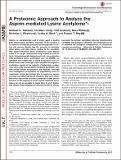Files in this item
A proteomic approach to analyze the aspirin-mediated lysine acetylome
Item metadata
| dc.contributor.author | Tatham, Michael H. | |
| dc.contributor.author | Cole, Christian | |
| dc.contributor.author | Scullian, Paul | |
| dc.contributor.author | Wilkie, Ross | |
| dc.contributor.author | Westwood, Nicholas J. | |
| dc.contributor.author | Stark, Lesley A. | |
| dc.contributor.author | Hay, Ronald T. | |
| dc.date.accessioned | 2016-12-15T17:30:19Z | |
| dc.date.available | 2016-12-15T17:30:19Z | |
| dc.date.issued | 2017-02-01 | |
| dc.identifier | 248156542 | |
| dc.identifier | 1223a201-82dd-4401-a774-0836730924b6 | |
| dc.identifier | 85013155822 | |
| dc.identifier | 000393992300014 | |
| dc.identifier.citation | Tatham , M H , Cole , C , Scullian , P , Wilkie , R , Westwood , N J , Stark , L A & Hay , R T 2017 , ' A proteomic approach to analyze the aspirin-mediated lysine acetylome ' , Molecular and Cellular Proteomics , vol. 16 , pp. 310-326 . https://doi.org/10.1074/mcp.O116.065219 | en |
| dc.identifier.issn | 1535-9476 | |
| dc.identifier.other | ORCID: /0000-0003-0630-0138/work/56424158 | |
| dc.identifier.uri | https://hdl.handle.net/10023/9978 | |
| dc.description | This work is supported by Cancer Research UK Grant C434/A13067 (M.H.T & R.T.H) and Wellcome Trust Grant 098391/Z/12/7 (R.T.H.). | en |
| dc.description.abstract | Aspirin, or acetylsalicylic acid is widely used to control pain, inflammation and fever. Important to this function is its ability to irreversibly acetylate cyclooxygenases at active site serines. Aspirin has the potential to acetylate other amino-acid side-chains, leading to the possibility that aspirin-mediated lysine acetylation could explain some of its as-yet unexplained drug actions or side-effects. Using isotopically labeled aspirin-d3, in combination with acetylated lysine purification and LC-MS/MS, we identified over 12000 sites of lysine acetylation from cultured human cells. Although aspirin amplifies endogenous acetylation signals at the majority of detectable endogenous sites, cells tolerate aspirin mediated acetylation very well unless cellular deacetylases are inhibited. Although most endogenous acetylations are amplified by orders of magnitude, lysine acetylation site occupancies remain very low even after high doses of aspirin. This work shows that while aspirin has enormous potential to alter protein function, in the majority of cases aspirin-mediated acetylations do not accumulate to levels likely to elicit biological effects. These findings are consistent with an emerging model for cellular acetylation whereby stoichiometry correlates with biological relevance, and deacetylases act to minimize the biological consequences non-specific chemical acetylations. | |
| dc.format.extent | 17 | |
| dc.format.extent | 4098282 | |
| dc.language.iso | eng | |
| dc.relation.ispartof | Molecular and Cellular Proteomics | en |
| dc.subject | Acetylation | en |
| dc.subject | Cancer therapeutics | en |
| dc.subject | Chemical biology | en |
| dc.subject | Chemoproteomics | en |
| dc.subject | Drug targets | en |
| dc.subject | Histones | en |
| dc.subject | Post-translational modifications* | en |
| dc.subject | Signal Transduction | en |
| dc.subject | Substrate identification | en |
| dc.subject | Aspirin | en |
| dc.subject | QD Chemistry | en |
| dc.subject | NDAS | en |
| dc.subject | SDG 3 - Good Health and Well-being | en |
| dc.subject.lcc | QD | en |
| dc.title | A proteomic approach to analyze the aspirin-mediated lysine acetylome | en |
| dc.type | Journal article | en |
| dc.contributor.institution | University of St Andrews. School of Chemistry | en |
| dc.contributor.institution | University of St Andrews. EaSTCHEM | en |
| dc.contributor.institution | University of St Andrews. Biomedical Sciences Research Complex | en |
| dc.identifier.doi | https://doi.org/10.1074/mcp.O116.065219 | |
| dc.description.status | Peer reviewed | en |
| dc.identifier.url | http://www.mcponline.org/content/early/2016/12/02/mcp.O116.065219/suppl/DC1 | en |
This item appears in the following Collection(s)
Items in the St Andrews Research Repository are protected by copyright, with all rights reserved, unless otherwise indicated.

